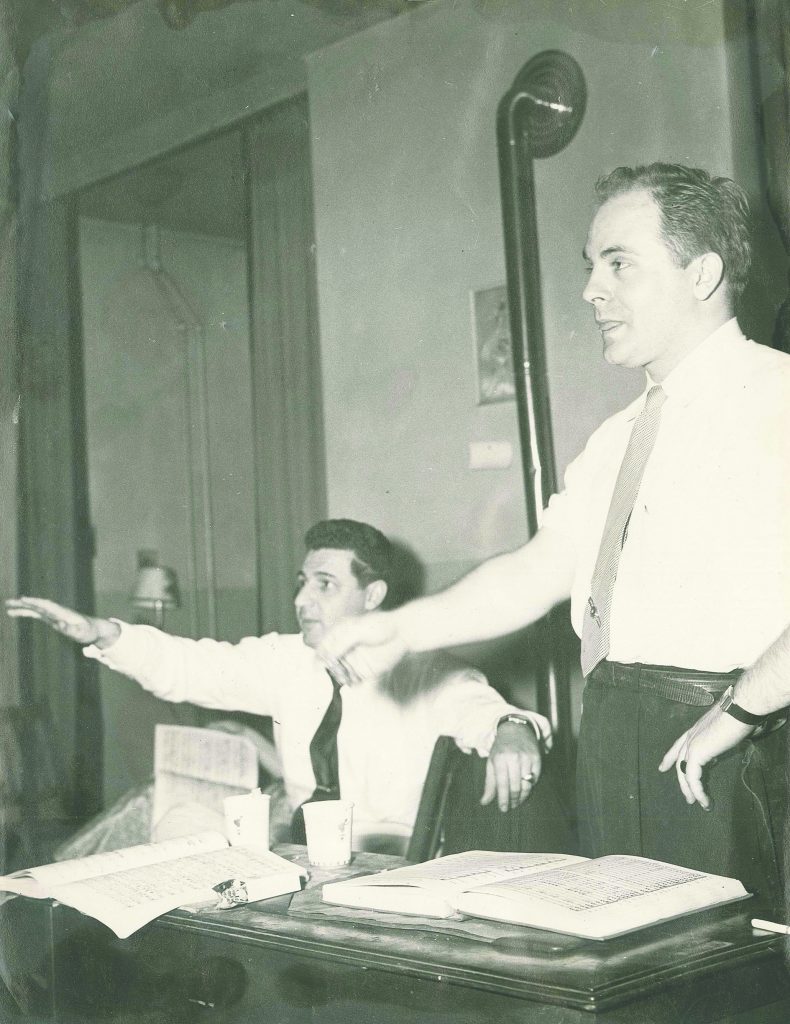
This weekend, Tri-Cities Opera’s (TCO) production of “H.M.S Pinafore” will close out its 2018-19 opera season, which marks the company’s 70th anniversary. For seven decades, TCO has made opera accessible to new audiences and aspiring performers through its presence in both the local community and Binghamton University’s music department.
One of the oldest opera companies in the nation, TCO was founded in 1949 by conductor Peyton Hibbitt and singer Carmen Savoca, who was an adjunct professor of 20 years and co-director of the Master of Music in Opera program at BU. Savoca and Hibbitt were succeeded by Duane Skrabalak, a Johnson City native who participated in the company for 44 years in various roles. Upon Skrabalak’s passing in 2014, current Artistic Director Susan Ashbaker took the helm.
Ashbaker said she remembers Hibbitt’s and Savoca’s involvement with the local community and commitment to expressive, engaging opera.
“They were always about good singing and they were always about integrating singing into the text so everybody had something to say,” she said. “Opera is storytelling at its very best, and I hold those truths to be important as I march forward with [TCO].”
TCO puts on three or four full-scale productions per season in Binghamton, playing at both the Broome County Forum Theatre on Washington Street and the TCO Center on Clinton Street. In addition to producing shows, the company runs an artist training program for opera singers and a business that rents sets, costumes, instruments and sheet music to other performance groups.
Before becoming TCO’s director of community engagement in 2017, Binghamton community member Andréa Gregori was a resident artist with the company from 1994 to 1998. After going to college in Philadelphia, she moved to Binghamton to audition for the chance to train under Hibbitt and Savoca.
Gregori said TCO’s residency program is uniquely rigorous, adhering to traditional practices in vocal training.
“The work that I did in my time at TCO was some of the most challenging and rewarding work that I ever did,” she said. “They forced us to give 110 percent all the time, and that kind of training doesn’t really exist anymore. I’m glad I had that foundation to help me toughen my hide and get me ready for all the additional challenges I was about to face.”
The company takes measures to engage a variety of audiences, supplying projected English subtitles at foreign-language shows, bringing contemporary American operas to the stage and hosting free opera previews, which are meant to clarify the storylines of the shows before they premiere. TCO also reaches new audiences through informal performances like the “Opera and Beer!” and “Cabaret on Court” events hosted at Garage Taco Bar and Dos Rios Cantina.
Gregori said these performances offer a less expensive and more engaging experience for opera newcomers, nurturing interest through intimate performances in a familiar setting.
“A lot of patrons find that so appealing — it gives them the chance to experience these singers up close and personal like they wouldn’t be able to in an opera house,” she said.
The company exposes younger audiences to opera through local events, career expos and their touring educational program Opera-Go-Round, which has brought live performances to schools throughout New York and Pennsylvania for 44 years, reaching as many as 20,000 students annually.
Gregori said connection with youth through arts education is a top priority for the company.
“One of the things that’s important to us is always finding ways to reach the younger generations,” she said. “Unfortunately, our audience is aging, so we’re always looking for ways to reverse that trend.”
TCO also maintains strong connections with the BU community. Student tickets to shows are half price and the company frequently recruits BU students and alumni to sing in shows or join the company full time as resident artists.
Gina Moscato, ‘18, a soprano resident artist who graduated from BU with a master’s degree in vocal performance, said she was drawn to BU for graduate school because of the TCO connection.
“BU has had this connection with TCO for many years, and it’s one of very few programs in America that combines a university with a real regional opera company, so it’s really unique,” she said. “It’s really amazing to be able to walk out of my master’s and have a job singing because it’s so incredibly hard to get hired, especially right out of school.”
Evan Nelson, a second-year graduate student studying vocal performance, agreed that the presence of TCO has eased his transition into professional opera.
“It’s nice because now I know these people who are currently working in the industry who I can reach out to,” he said. “It’s been really good to get a behind the scenes look at what it takes to be a professional singer.”
Ashbaker said TCO has prioritized education from its inception, maintaining a symbiosis with BU that draws out-of-state talent to the company while providing students a platform for growth. Seven decades after TCO’s founding, she said student engagement is as integral to the company as ever.
“[Hibbit and Savoca] created this alliance and the alliance had shifted over time to be whatever was needed from the university and TCO … that’s always been one of the hallmarks of the master’s in music program,” she said. “We always have roles that young artists can participate in, so that mission is still upheld.”
H.M.S Pinafore will debut at 3 p.m. on Sunday at the Broome County Forum Theatre.


